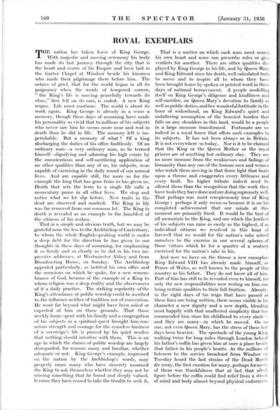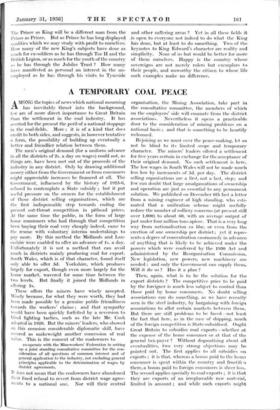ROYAL EXEMPLARS
THE nation has taken leave of King George. With majestic and moving ceremony his body has made its last journey through the city that is the heart and centre of his Empire and been laid in the Garter Chapel at Windsor beside his kinsmen who made their pilgrimage there before him. The octave of grief, that for the world began in all its poignancy when the words. of tempered sorrow, " the King's life is moving peacefully towards its close," first fell on its ears, is ended. A new King reigns. Life must continue. The world is about its work again. King George is already in a sense a memory, though these days of mourning have made his personality so vivid that to millions of his subjects who never saw him he seems more near and real in death than he did in life. The memory left is im- perishable. But a memory of what ? Of a king discharging the duties of his office faultlessly. Of an ordinary man—a very ordinary man, as he termed himself—dignifying and adorning his high estate by the conscientious and self-sacrificing application of no other qualities than any of us, his subjects, were capable of exercising in the daily round of our normal lives. And are capable still, the more so for the example the king that has gone from us has given us. Death that sets the term to a single life calls a momentary pause in all other lives. We stop and notice what we let slip before. New traits in the dead arc observed and marked. . The King in life was far removed from our common lot. The King in death is revealed as an example to the humblest of the citizens of his realms.
That is a simple and obvious truth, but we may be grateful none the less to the Archbishop of Canterbury, to whom the whole English-speaking world is under a deep debt for the direction he has given to our thoughts in these days of mourning, for emphasising it so firmly and so clearly as he did in his two im- pressive. addresses, at Westminster Abbey and from Broadcasting House, on Sunday. The Archbishop appealed particularly, as befitted his own office and the occasions on which he spoke, for a new remem- brance of God, because of the example of a King to whom religion was a deep reality and the observances of it a daily practice. The striking regularity of the King's attendance at public worship could be ascribed to the influence neither of tradition nor of convention. He went far beyond what might have been asked or expected of him on those grounds. That those weekly hours spent with his family and a congregation of his subjects in a spiritual quest brought him con- scious strength and courage for the ceaseless business of a sovereign's life is proved by his quiet resolve that nothing should interfere with them. This is an age in Which the claims of public worship are largely disregarded, for reasons many and familiar, whether adequate or not. King George's example, impressed on the nation by the Archbishop's , words, may properly cause many who have sincerely mourned the King to ask themselves whether they may not be missing something that he found and deeply valued, bdcause they have ceased to take the trouble to seek it:. That, is a matter on which each man must search his own, heart and none can prescribe rules, or give verdicts for another. There are other qualities dis-_ played by King George in his life, and by Queen Mary and King Edward since his death, well calculated both to move and to inspire all to whom they have been brought home by spoken or printed word in these days of national bereavement. A people modelling itself on King George's diligence and kindliness and self-sacrifice, on Queen Mary's devotion ,.family as well as public duties, and her wonderful fortitude in the hour of widowhood, on King Edward's quiet and unfaltering assumption of the heaviest burden that falls on any shoulders in this land, would be a people in a large measure transformed. Fortunate are we indeed in a royal house that offers such examples to its subjects. It has not been always so in Britain. It is not everywhere so today.. Nor is it to be claimed that the King or the Queen Mother or the royal princes are of anything but ordinary clay. They are no more immune .from the weaknesses and failings of humanity than any one of the human men and women who watch them moving in that fierce light that beats upon a throne and exaggerates every littleness and every fault. No higher tribute indeed need be offered them than the recognition that the work they_ have to do they have done and are doing supremely,well. That perhaps was most conspicuously true of King George ; perhaps it only seems so because it is on his completed achievement that our minds at this moment are primarily fixed. It would be the best of all memorials to the King, and one which the, jowliest of his subjects can raise as easily as the, highest,. if as: individual citizens we resolved in this hour of farewell that we would for the nation's, sake school ourselves to the exercise in our several spheres of those virtues which he for a quarter of a century exercised for the nation's sake in his.
And now we have on the throne a new exemplar. King Edward VIII has already made himself, as Prince of Wales, as well known to the, people of this country as his father. They do not know all of him. Part of him has still to be revealed even to himself, for only the new responsibilities now resting on him can bring certain qualities to their full fruition. Already, in the eight days of his reign that have passed as these lines are being written, there seems visible in his character a new dignity and a new depth, blending most happily with that unaffected simplicity that has commended him since his childhood to every circle— and they are many—in which he moved. On no one, not even Queen Mary, has the stress of these last days been heavier. The spectacle of the-young King walking twice for long miles through London behind his father's coffin has given him at once a place beside that father in his people's hearts. As the millions of listeners to the service broadcast from Windsor on Tuesday heard the list strains of the Dead March die away, the first emotion for many, perhaps for most, of them was thankfulness that at last that silent figure before the coffin could find relief from a strain of mind and body almost beyond phySical endurance. The Prince as King will be a different man from the Prince as Prince. But as Prince he has long displayed qualities which we may study with prOfitto onrieh-es: How many of the new King's subjects have done as much for ex-soldierS as he has through Toe H and the British Legion, or as much for the youth of the country as he has through the Jubilee Truit ? How many have manifested as personal an interest in the un- employed as he has through his visits to Tyneside and other suffering areas ? Yet in all these fields it is open to everyone not indeed to do what the King his done, but at least to do something. Two of the keynotes to King Edward's character are reality and simplicity. None of us but Would be better for more of them ourselves. Happy is the country whose sovereigns are not merely rulers but exemplars to their people, and unworthy the citizen to whose life such examples make no difference.











































 Previous page
Previous page